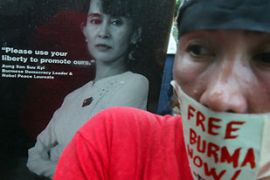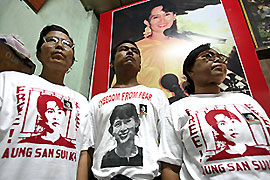US presses Myanmar to free Suu Kyi
Officials hold “very frank” talks at rare face-to-face meeting brokered by China.

However, Casey added that Myanmar had shown no sign of relenting over the detention of Aung San Suu Kyi or thousands of other political prisoners.
“I don’t think we saw anything coming out of them that would indicate, unfortunately, that they had changed their basic opinions,” he said.
The meeting came just under a month after the military authorities in Myanmar extended the opposition leader’s house arrest by another year.
| Myanmar timeline |

1988: Military crackdown on pro-democracy protests, estimated 3,000 killed
1989: Aung San Suu Kyi sentenced to house arrest for allegedly endangering the state
1990: NLD wins landslide in national election; military refuses to recognise result
1991: Suu Kyi awarded Nobel Peace Prize
1995: Suu Kyi freed, but movements restricted
1997: Myanmar admitted to Asean
2000: Suu Kyi sentenced to house arrest for defying travel restrictions
2002: Suu Kyi released following UN-facilitated secret talks with government
2003: Government unveils “road map” to democracy; Suu Kyi returned to house arrest after her convoy is attacked in north of country
2005: Government announces shift to new capital Naypidaw
2007: Nearly 3,000 prisoners released in amnesty to mark independence anniversary, but no key political figures freed |
Eric John, a deputy assistant secretary of state, represented the US at the Beijing talks, while Kyaw Hsan, Myanmar‘s information minister, was accompanied by the country’s foreign and culture ministers.
The meeting took place at the request of Myanmar, the US state department said.
The last such high-level talks were in 2003.
The Chinese capital was chosen as the venue because the US says it will only travel to Myanmar, formerly known as Burma, if its officials are allowed to meet Aung San Suu Kyi.
“The government of Burma often prefers that we would meet with them in Burma. Our longstanding policy is we will not meet them in Burma – outside of our embassy offices – if they will not allow us to meet with Aung San Suu Kyi,” Casey said.
Aung San Suu Kyi’s National League for Democracy (NLD) won a landslide victory in elections in 1990, but the military refused to recognise the result.
Apart from a brief period in Yangon’s notorious Insein jail, she has been kept locked in her Yangon home.
Myanmar authorities say that to release her would create a threat to public order.
She has now spent 11 of the past 18 years under house arrest.
Constitution
 |
| Several NLD members were arrested protests marking Aung San Suu Kyi’s birthday [AFP] |
Commenting on Tuesday’s meeting, Casey said Washington had agreed to talks with Myanmar officials to “reinforce the messages they were receiving” from the UN special envoy, Ibrahim Gambari.
He has visited Myanmar several times to press the military rulers to release Aung San Suu Kyi and bring about national reconciliation.
Myanmar is reportedly anxious for Gambari, who was allowed twice to meet with Aung San Suu Kyi, to pay another visit to Myanmar in July when it finalises a national convention to draw up guidelines for a new constitution.
Earlier, officials from the NLD in Myanmar said the government had freed most of the 52 activists detained last month after holding protests calling for Aung San Suu Kyi’s release.
However, party officials said they remained concerned about Phyu Phyu Thin, a prominent Myanmar Aids activist, who was not released.
She was taken from her home on May 21 for questioning by police and recently went on a hunger strike and was reportedly not well.
News of the Beijing meeting came as the head of the International Committee of the Red Cross issued a rare public denunciation of what he said were Myanmar‘s “major and repeated violations” of humanitarian law.
Jakob Kellenberger, the organisation’s president, said many thousands of people in Myanmar were living in a “climate of constant fear” as a result of the actions of the country’s armed forces.